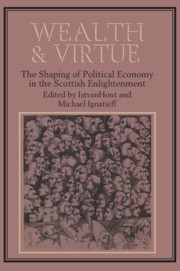Book contents
- Frontmatter
- Contents
- Preface
- List of abbreviations
- 1 Needs and justice in the Wealth of Nations: an introductory essay
- 2 Where had the Scottish economy got to by the third quarter of the eighteenth century?
- 3 Gershom Carmichael and the natural jurisprudence tradition in eighteenth-century Scotland
- 4 The Scottish professoriate and the polite academy, 1720–46
- 5 From applied theology to social analysis: the break between John Locke and the Scottish Enlightenment
- 6 The Scottish Enlightenment at the limits of the civic tradition
- 7 Adam Smith as civic moralist
- 8 The legal needs of a commercial society: the jurisprudence of Lord Kames
- 9 Cambridge paradigms and Scotch philosophers: a study of the relations between the civic humanist and the civil jurisprudential interpretation of eighteenth-century social thought
- 10 Adam Smith's ‘enduring particular result’: a political and cosmopolitan perspective
- 11 The ‘rich country–poor country’ debate in Scottish classical political economy
- 12 John Millar and individualism
- 13 Scottish echoes in eighteenth-century Italy
- Index
10 - Adam Smith's ‘enduring particular result’: a political and cosmopolitan perspective
Published online by Cambridge University Press: 05 June 2012
- Frontmatter
- Contents
- Preface
- List of abbreviations
- 1 Needs and justice in the Wealth of Nations: an introductory essay
- 2 Where had the Scottish economy got to by the third quarter of the eighteenth century?
- 3 Gershom Carmichael and the natural jurisprudence tradition in eighteenth-century Scotland
- 4 The Scottish professoriate and the polite academy, 1720–46
- 5 From applied theology to social analysis: the break between John Locke and the Scottish Enlightenment
- 6 The Scottish Enlightenment at the limits of the civic tradition
- 7 Adam Smith as civic moralist
- 8 The legal needs of a commercial society: the jurisprudence of Lord Kames
- 9 Cambridge paradigms and Scotch philosophers: a study of the relations between the civic humanist and the civil jurisprudential interpretation of eighteenth-century social thought
- 10 Adam Smith's ‘enduring particular result’: a political and cosmopolitan perspective
- 11 The ‘rich country–poor country’ debate in Scottish classical political economy
- 12 John Millar and individualism
- 13 Scottish echoes in eighteenth-century Italy
- Index
Summary
The initial premise of this paper is stunningly obvious: the main prize in any attempt to establish connections between the civic tradition, natural jurisprudence, and political economy, considered within an eighteenth-century Scottish context, must be awarded to an interpretation that succeeds in capturing the Wealth of Nations and whatever else seems essential to secure that summit once reached. This military-cum-mountaineering metaphor accords with some harmless competitive features of the present state of scholarly debate, and I shall continue the theme by defending a particular interpretative route, while suggesting that various rocks obstruct one of the alternative paths. But in so doing, I shall certainly not be claiming any prizes for reaching the summit; and in upholding a particular side in the dialogue now joined, I shall not question John Pocock's wisdom in pointing out that there may be more than one route, and that the connections between routes have yet to be established. Indeed, in the present state of Smith scholarship it would be unwise to assume that we are anywhere near the end of the process of understanding the connections between the overlapping sub-systems that compose Smith's highly ambitious and systematic enterprise – the most ambitious enterprise to be carried through to near-completion in an age and place that was notable for the compendious quality of its intellectual projects.
Walter Bagehot was nearer the truth than either he or his readers could perhaps have appreciated in 1876 when he said of Smith that ‘scarcely any philosopher has imagined a vaster dream’; and that Smith was that rare creature who had ‘produced an enduring particular result in consequence of a comprehensive and diffused ambition’.
- Type
- Chapter
- Information
- Wealth and VirtueThe Shaping of Political Economy in the Scottish Enlightenment, pp. 253 - 270Publisher: Cambridge University PressPrint publication year: 1983
- 28
- Cited by

